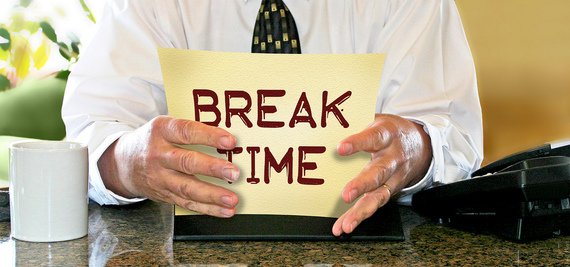Imagine that you are training for a marathon. The date is one month away and you've been training for a year. You really want to do well, so you decide that you are going to run all day every day for the last 30 of training. You won't even take a break for lunch because you don't want to interrupt your 10 hours of non-stop running.
Can you imagine the effects that would have on your body? You would definitely not perform well on race day. In fact, you would probably be injured and unable to run.
There's a good reason why marathon training regimens include lots of rest in between training runs. The body needs rest in order to repair itself and prepare for the next training run.
We all know that our muscles need rest between periods of intense exercise. However, many of us don't seem to realize that our brains, too, need rest between intense periods of exercise.
The Science of Breaks
Two recent studies conducted at the University of Illinois and the University of Canterbury suggest that our performance is improved when we take breaks and disengage from what we're working on. Another study at the University of Canterbury even suggests that the longer one performs a task, the longer breaks need to be in order to prevent a decline in performance.
Over the long term, we're actually much more productive if we take breaks than if we work non-stop for hours on end.
The brain is the most energy intensive organ in the body. According to this article in Scientific American, despite comprising only about 2 percent of the mass of the body, the brain uses more than 20 percent of the energy in the body!
If we don't give the brain breaks, it simply fatigues and becomes less effective.
A Productivity Plan that Includes Breaks
Many productivity experts encourage taking a five-minute break every 25 minutes (the Pomodoro Technique) or a 10-minute break every 50 minutes. The idea is to be hyper focused on whatever task we're working on for a specified period of time, and then intentionally relaxing the mind for a period of time.
Because I'm a morning person, the sweet spot for me tends to be working for 50 minutes with a ten-minute break in the mornings, and then shortening the time of intense work as the day progresses after lunch time. If you're an afternoon person, you might want to reverse this, starting with shorter periods of work in the morning and then lengthening them as you feel more energized.
I'm always amazed by how quickly solutions come after taking a break, or even while on I'm on a break. Often times, after working to find a solution for 30 minutes or more, clarity on the best way to proceed often comes almost instantly during a break, or when I first start to work on the task again after the break.
Boost Your Breaks with Mindfulness
To get the most out of your breaks, I highly recommend taking at least a few minutes to allow your mind to completely disengage from thinking by practicing mindfulness. Whether you practice while walking, standing, sitting, or doing some simple task like cleaning your desk, or washing your hands, or eating, or drinking (proper hydration and blood sugar levels are also essential components of brain effectiveness), make an effort to let go of intentionally thinking.
Instead, try to notice whether or not you are thinking and keep your awareness open to what's actually happening in the present moment. You may notice that there is a lot of thinking, which is to be expected on a break. Just recognize that there is thinking present and be open to what else you notice. You might notice sounds, sights, physical sensations, or even smells or tastes. Whatever is happening, just keep an open, curious attitude of "What's happening right now?"
Have you experimented with being intentional about taking breaks?
What have you noticed as a result?
I'd love to see your comments below.
*****
Matt Tenney is the author of Serve to Be Great, and the forthcoming book The Mindfulness Edge: How to Rewire Your Brain for Leadership and Personal Excellence Without Adding to Your Schedule. To be among the first to get a free preview of Matt's new book, visit www.TheMindfulnessEdge.com.
To connect with Matt, visit www.MattTenney.com.

